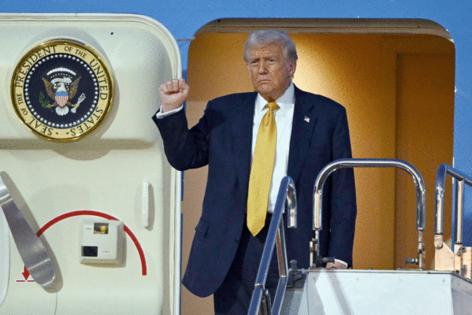Trump heads to South Korea with pivotal trade questions looming
Published in News & Features
U.S. President Donald Trump heads to South Korea on Wednesday for a high-stakes meeting with counterpart Lee Jae Myung, as the leaders seek to hammer out the details of a $350 billion investment pledge at the heart of a critical trade deal between the two nations.
South Korea is the final stop on Trump’s three-nation tour through Asia, as leaders gather for the Asia-Pacific Economic Cooperation summit in the southern city of Gyeongju. The U.S. president’s meeting with Lee serves as an appetizer ahead of Thursday’s main course: a pivotal summit with Chinese leader Xi Jinping.
The White House had looked to provide Trump momentum by signing a series of economic and military announcements with top U.S. partners across the region. But the relationship with South Korea has underscored the difficulty in converting that ambition into concrete results.
While the U.S. and South Korea announced an initial trade deal in July, protracted negotiations between the two economies have dragged on for months. Key details, including the composition of the South Korean investment pledge, remain unresolved.
By contrast, the U.S. and Japan reached a memorandum of understanding on a similar pledge in early September and unveiled initial details of some of the projects under consideration on Tuesday. That leaves Seoul looking like a more reluctant ally, while leaving its automakers at a clear disadvantage on tariffs compared with its Asian neighbor.
South Korea envisions a mix of direct investments, loans and guarantees for the package, while Trump has repeatedly said that Seoul should make the investment an “upfront” payment.
Lee, in an interview published earlier this week, said substantial gaps remained between the sides.
“The method of investment, the amount of investment, the timeline and how we will share the losses and divide the dividends — all of these remain sticking points,” Lee said.
The U.S., for its part, has looked to downplay the disagreement. Treasury Secretary Scott Bessent told reporters Monday that the talks were “very close” while conceding a final agreement wouldn’t be completed during Trump’s visit.
The president and U.S. Trade Representative Jamieson Greer have pointed to planned announcements on shipbuilding as evidence that the two sides are nearing consensus.
“The Koreans have a great plan to invest in U.S. shipbuilding even more than they’ve already done it,” Greer said. “And so they’re talking right now, frankly, about how to implement Korean investment in the United States in the best way.”
That investment pledge is the centerpiece of the broader trade deal between the U.S. and South Korea, one which would cap U.S. tariffs on Korean goods at 15%. The U.S. struck a separate deal for a $550 billion investment pledge with Japan, with automakers in that country now facing a levy of 15%.
Without its own deal, however, South Korean car and auto parts manufacturers will see their tariff on exports to the US stay at 25% rather than 15%, keeping them at a competitive disadvantage to Japanese rivals. The delay in reaching a deal suggests the Korean version may be more detailed than the one inked for its neighbor.
South Korea has long enjoyed a zero tariff on auto exports to the U.S. under a free trade agreement, while Japan faced a 2.5% levy, but is now at risk of losing that edge. Leaders from Seoul have flagged that complication to US officials, including Trump, but they have so far been unreceptive to the concerns.
Korean officials have worked hard to court the Trump administration, including a recent weekend of meetings that brought Seoul’s top tycoons to a golf event with Trump at his Mar-a-Lago estate. The heads of South Korean conglomerates, including Hyundai Motor Co., SK Inc. and Hanwha joined the Mar-a-Lago golf event, along with business leaders from Japan and Taiwan, according to Yonhap and other South Korean media.
South Korean businesses are among the United States’ largest foreign investors, expanding electric vehicle and semiconductor plants while also helping to revive America’s shipbuilding industry. But that investment activity also faces another headwind, as the country’s businesses have been ensnared in the Trump administration’s stepped-up immigration enforcement.
A September raid on a Hyundai and LG Energy Solution Ltd. electric battery plant under construction in Georgia saw more than 300 South Korean workers detained amid allegations they were working in the US illegally.
‘Whole New Plan’
While the workers were flown back home days later after diplomatic pressure, the incident soured relations between Washington and Seoul and highlighted the issues companies face in securing sufficient work visas to follow through on investment projects.
Trump on Monday said he was developing “a whole new plan” to ensure that highly skilled workers could enter the country to help set up manufacturing plants.
“They’ll teach our people how to do it, but even for a fairly long period of time, they’re going to need expertise to be successful,” Trump said. “I’m letting them know right now that when they come into our country, we can expect to see them bring in with them some very talented people.”
Those details will be critical to implementation of the trade agreement — and other deals Trump has championed with much fanfare during his time in the region. In recent days, the president has signed deals with Thailand, Cambodia, Vietnam and Malaysia despite officials acknowledging substantial details that still require negotiation.
The U.S. and South Korea are also expected to sign a deal Wednesday aimed at bolstering cooperation in artificial intelligence, quantum computing and 6G, according to a U.S. official.
©2025 Bloomberg L.P. Visit bloomberg.com. Distributed by Tribune Content Agency, LLC.







Comments